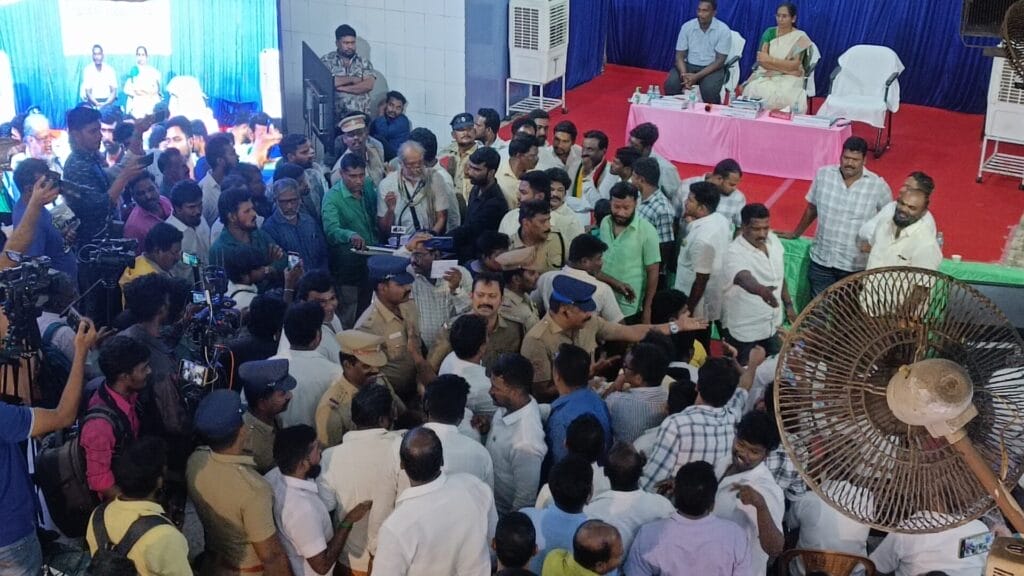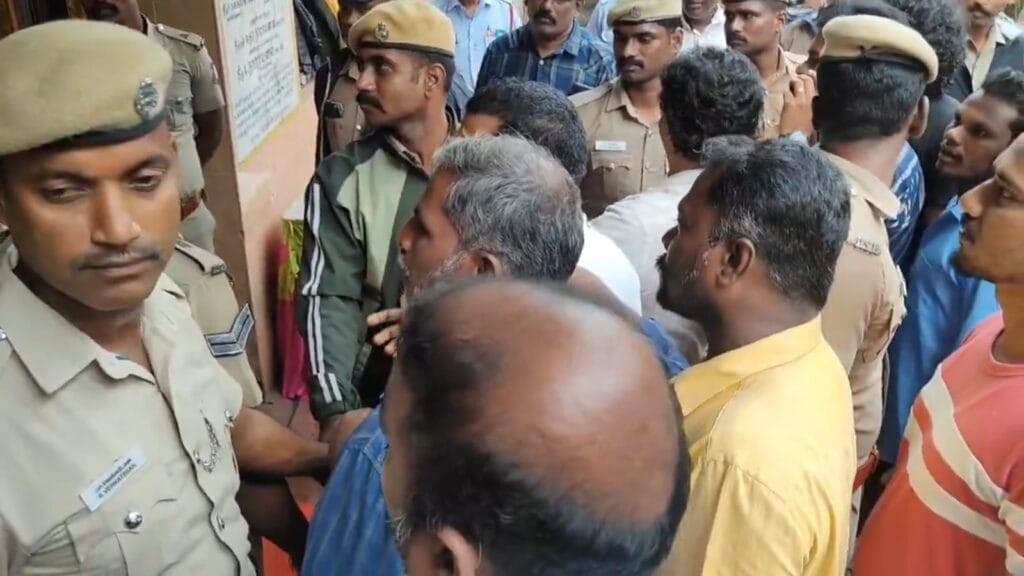On December 22nd last year, the Chennai District Collector and the Joint Chief Environmental Engineer of the Tamil Nadu Pollution Control Board (TNPCB) abruptly left Perunthalaivar Kamarajar Maligai in Ennore in the middle of a public hearing. The reason? Chaos and backlash from the local communities of Ennore, who wanted to voice their concerns regarding the Ennore Thermal Power Station (ETPS) Expansion Project. Since the meeting, the unrest has persisted, with many attendees saying they were not allowed to participate, express their views, or raise their concerns.
Of the 44 people who spoke at the hearing, only two were women. While the 44th person was speaking the Chennai Collector left the hall. TNPCB officials instructed the sound technicians to shut down the audio systems and the cameraman to stop the recording, which is the only legal record of the public hearing.
Read more: Ennore fishers’ open letter to TN government: Remove blockages in Kosasthalaiyar River
The communities in and around Ennore and Manali, along with environmental activists, have long opposed the expansion of the power plant because of the significant environmental and health impacts of the project on the local residents.
Concerns raised by the community
- The attendees questioned the need for another power plant, given that there are already over 40+ red-category industries, such as power plants, oil refineries, and fertiliser industries within two zones of Greater Chennai Corporation — Tiruvottiyur and Manali.
- There was a lack of proper representation of women in the public hearing. One supporter of an MLA questioned a woman who came to raise concerns, asking, “Why are you here?” Despite registering to speak, she was made to stand near the stage throughout the hearing. When she spoke, she mentioned, “Periyar came from Erode, but he fought for the rights of all people, so why does the MLA prevent people from other areas from speaking?”
- Attendees noted that Tamil Nadu’s electricity generation and supply are already self-sufficient. They questioned the need for a new thermal power plant under these conditions.
- The community suggested the use of sustainable renewable energy sources like solar and wind instead of fossil fuel-based energy generation.
- Currently, thermal power plants in Tamil Nadu are operating at 67% capacity. Attendees argued that existing plants should be run to full capacity before constructing a new one.

Proceedings of the hearing
On December 22nd, many people were not allowed entry into the hall because the police claimed it was full. However, political cadres appeared to be allowed inside. The supporters of the project were mostly political party members who often interrupted the residents of Ennore when they spoke. There were also a few supporters of the expansion from Burma Nagar in Ernavoor, who pointed out that the project would provide them with employment and livelihood.
According to a 2006 Environment Impact Assessment (EIA) notification, the summary of the public hearing proceedings should be recorded and read to the audience at the end of the meeting. However, this wasn’t followed in this case, because the proceedings were not read at the end of the hearing. The agreed minutes must also be signed on the same day, however, this couldn’t be done as the Chennai District Collector left in the middle of the hearing.

Additionally, the proceedings must be recorded and made available to the public within eight days of the hearing. However, the minutes were only released after 19 days (12 working days). I had to visit two offices to check on the status of the minutes. At the office of the Collector, I was told that the minutes had not yet been received for signing. When I visited the TNPCB office on January 8th to check if the staff had sent the minutes, they asked me to come the next day. Subsequently, the Assistant Environmental Engineer mentioned that the proceedings had been sent. The minutes were finally released on January 10th.
Read the minutes of the meeting here.
Reasons for the project’s delay
It has been 16 years since the project was proposed, but it has not been built due to various technical and political hurdles. The Tamil Nadu government proposed to expand the plant in 2008, but the ETPS was decommissioned in 2017 due to its age. Later the government decided to revive the project. Despite applying for Environment Clearance in 2018, the project faced delays due to people’s agitations, court orders, and the COVID-19 pandemic, which led to multiple reschedules and postponements of the public hearing.
Impact of existing industries on Ennore
There are two thermal power plants with six units running in Ennore, alongside the old ETPS plant, which have caused significant environmental damage. Hot water released into the Kosasthalaiyar River and Ennore Creek restricts the breeding of aquatic species, affecting the livelihoods of fisher communities. The release of toxic fumes has also affected the health of community members.
Ash from burnt coal is dumped in Seppakkam and Kuruvimedu along the Kosasthalaiyar River. During floods or regular ash pipe leaks, ash has been deposited up to eight feet in height over the riverbed.
Pollution from industries has increased the probability of cancer among Ennore residents, including children aged 3 to 10 years old.

Read more: Floods, oil spill and ammonia gas leak…what other horrors await Chennai’s Ennore?
The release of toxic fumes from the plant has affected the health of the people inhaling this air. During the public hearing, some people cited the EIA of the ETPS expansion project, to highlight that in the EIA, it was mentioned that there were no endangered species in the proposed area. They highlighted how the Ennore people are the “endangered species of the Ennore area.”
Other issues raised
- The area does not have adequate medical facilities — the nearest government hospital is 10 km away, while Stanley Government Hospital is at a distance of 15 km. RG Hospital is 20 km away.
- In 2019, the Tamil Nadu Housing Board (TNHB) started a massive project near the ETPS plant. This housing project with 6,877 tenements is dangerously close to the expansion project.
- The first industry came to Ennore in the 1960s and now there are more than 10 industries within Ennore’s limit. However, only a few local residents have got jobs in these factories, of that even fewer secured permanent jobs.
- Environment protection guidelines prohibit construction over lakes, ponds or other water bodies, but according to government revenue records, the proposed ETPS expansion includes a lake called Pattarai Eri.
- As the Tamil Nadu government is eagerly working to tackle the impacts of climate change, it is important to reconsider the decision to have a thermal power plant and look for other sustainable alternatives.
- The validity of the baseline data has expired, rendering the environment clearance obtained with the EIA report void due to the invalid baseline data. Therefore, this public hearing is legally invalid.
How organisations and civil society have responded
Thus considering all of these factors, the people from the community, environmental activists and even allies of the ruling party have requested the Tamil Nadu government to scrap the ETPS expansion project.
- On December 17th, the Environment and Child Health Chapter of the Indian Academy of Pediatrics sent a letter of concern to the Chennai District Collector, TNPCB authorities and the Union Ministry of Environment, Forests and Climate Change highlighting the project’s adverse impacts on children and pregnant women. It advised against going ahead with the proposed project.
- A day before this, through a press release, three retired judges, including Justice S Muralidhar (Chief Justice, Odisha High Court), Justice K Kannan, retired judge, Punjab and Haryana High Court and Justice D Hariparanthaman (retired), Madras High Court, wrote to the authorities concerned, asking them to ensure that the consultation for the project is conducted lawfully and that every person wanting to voice their concerns, be allowed to do so. But, as the public hearing was not conducted lawfully, on January 4th, they released another press release urging the Union Environment Ministry to investigate allegations of unlawful conduct of the public hearing.
The city’s development must go hand in hand with the progress and upliftment of the marginalised communities. However, the ill-conducted public hearing and the authorities’ disregard for the fears and concerns of the people living in the industry-heavy areas of Chennai show that their voices are neglected to cater to the elite areas of the city.
excellent work by you sir. hope the people will win.
well documented the happenings of the public consultation on the the expansion project of thermal power station. all questions raised are very valid and government should explain and cannot execute bypassing these concerns. While the world is looking for renewable green energy, why are we still stuck to such adversely impacting methods to generate electricity without applying the mind and facilitating more man made disasters